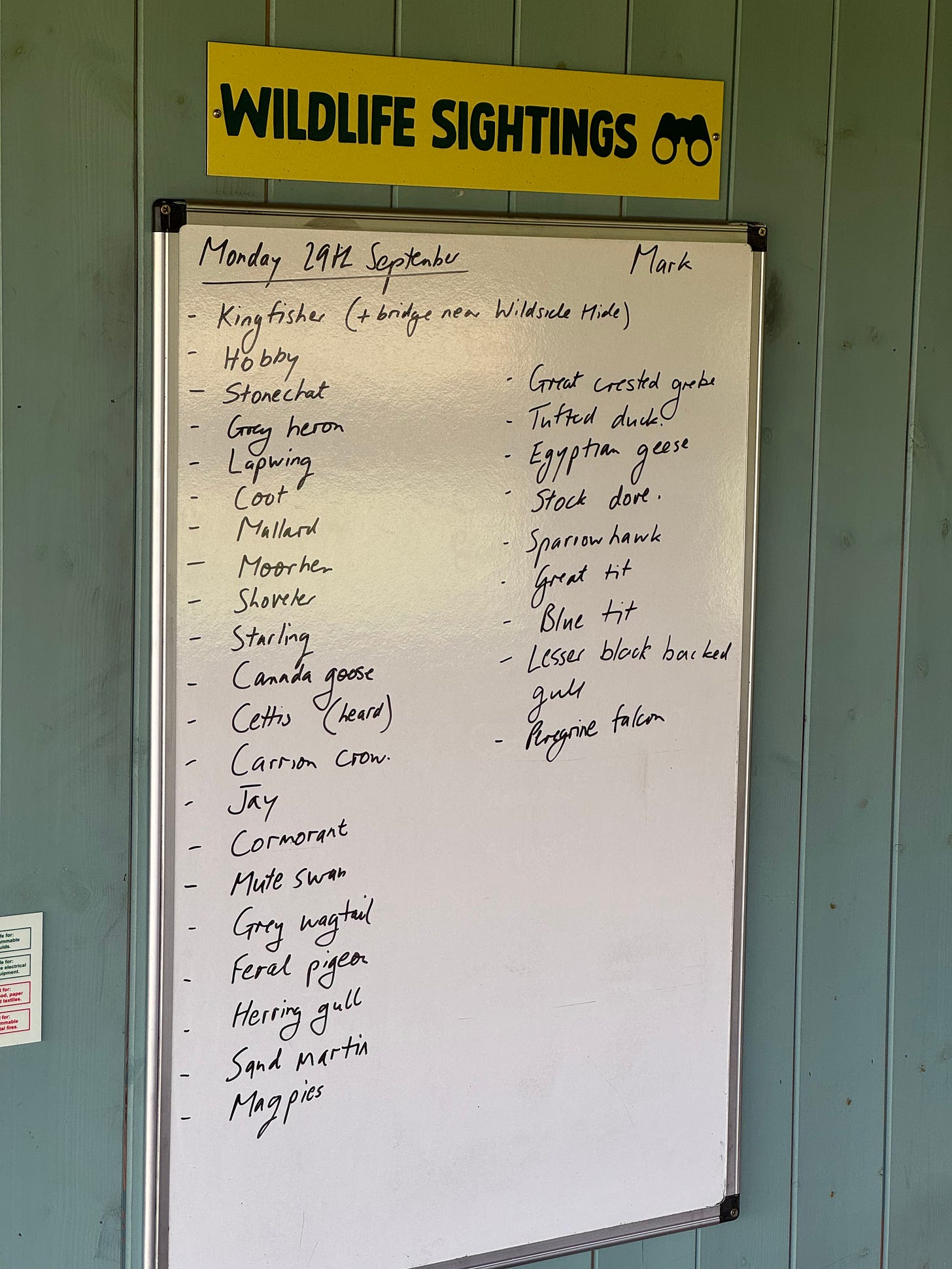Autumn reveals itself through the mist
My magic Monday at the London Wetland Centre
My Monday bike ride into work definitely improves as it goes along.
Some would say that any journey that starts with the South Circular Road can only go up.
By the time I hit Putney though I can drop down onto the Thames towpath and start to breathe easier.
On a clear day that particular meander of the river past Fulham football ground, is framed ten miles off in the distance by the arch at Wembley stadium, in a symmetry that I am sure was unintended by its architects.
But this late September morning I realised I was cycling into a view of the river that might have been painted by Monet or Whistler.
A cormorant raced ahead of me in its eagerness to trace the river’s curve then just disappeared into a bank of fog.
The turn that the seasons had taken in the two weeks I had been away was even more marked when I arrived at the London Wetland Centre for my shift as a volunteer ‘guide in the hide’.
By then the mist from the river had been burnt off by the early morning sunshine. I noticed straightaway that the vegetation had started to die back. Some of summer’s lushness had been lost but the bonus was that more of nature’s comings and goings had been exposed.
When I got to the Headley Hide to make it ready for that day’s visitors it was all action stations.
Through the glass I could see a jay burying acorns for its winter pantry, another sign of autumn.
Kingfishers were whizzing up and down the channels, their flashes of blue more visible now the rushes had thinned out.
Coupled-up stonechats were passing through from the moors of the north to head for the milder weather on the south coast.
There was even a grey wagtail bobbing up and down along the perimeter of the scrape directly in front of me. Six years earlier pre-pandemic, this was one of the birds that had started to impinge itself on my hitherto nature-free consciousness. That setting was an unlikely one. The grey wagtail is a bird of clear, fast-flowing streams but this one kept on turning up on the flat rooftop adjoining our offices in central London. Apparently in winter, any puddle will do.
That Monday it wasn’t just about the birds.
Some of my favourite humans dropped by too.
I compared notes on our respective commutes with Kathy, a fellow ‘guide in the hide’, who works on the grounds on a Monday. We both live on Brixton Hill. I was feeling quietly smug about cycling to work all the way from there until she told me that she walks to Barnes and back - two hours on foot each way.
Sevim another colleague dropped into the hide. She works an early shift cleaning the visitor centre. When she finishes up there, she changes into civilian mufti and grabs her long lens to capture wildlife shots for her social media accounts.
Then came ‘Bermondsey Dave’, my moniker for the former taxi driver and a Monday regular in my hide. His weekday timetable is an enviable one. Two days a week birding and two days of fishing, with a rest day in between.
Whilst catching up with Dave’s news, a woman dropped in who was quite literally a ‘vagrant’ as birds that have wandered off course on their migration are described.
Originally a native Londoner she had spent the last decade in New Zealand, raising a family there. The previous day they had all flown into Heathrow en route to a break on the Amalfi Coast, only for her to be turned away at the gate. Whilst her British passport was good enough to get her back into the UK, it didn’t pass muster with the EU. Waving her husband and child off on the flight to Italy, she had headed directly to the London Wetland Centre whilst an emergency passport was made ready for her.
She explained that although New Zealand birdlife may appear exotic at first - most species are unique to that cut-off archipelago - there was a sameness to it that palled after a few years. Stuck out in the middle of the Pacific there was very little in the way of bird migration there. Back in London on a brilliant autumn day where it was all change she was drinking in the birdlife that she knew here as a child and loving every minute of it.
As I locked up, I reflected that it had been quite a shift.
The seasons had literally unfolded before my eyes.
I had had as good a set of bird sightings as I could remember as a ‘guide in the hide’.
But just as important as the biodiversity was the human diversity that had made that Monday a truly magical one.





Yet again you have challenged my perception that London is all urban sprawl with little if any natural habitat or wildlife.